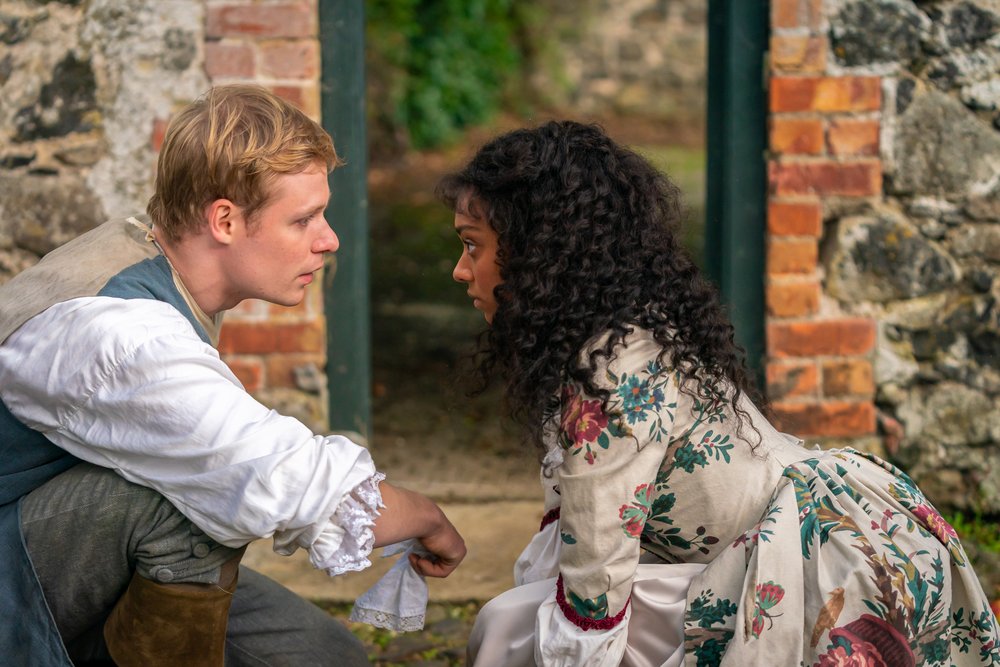In a busy spring for prestige television, critically acclaimed shows like Succession, Barry, and Ted Lasso signed off with emotional finales. Meanwhile, a more modest production, PBS Masterpiece’s Tom Jones, came and went with little fuss. It’s worth a closer look, however, because it reveals the shortcomings of modern entertainment’s focus on racial identity.
The miniseries is the latest adaptation of Henry Fielding’s The History of Tom Jones: A Foundling (1749), a rollicking novel about the misadventures of its title character. An abandoned child raised by a benevolent country gentleman, Tom has affairs with several women throughout the very long and occasionally bawdy novel, but his true love is Sophia Western, a neighboring squire’s daughter. Unfortunately, his low birth and her betrothal to an undeserving cad mean they can never marry. Or can they?
Any adaptation of Fielding’s nearly 1,000-page novel will have to make difficult cuts and tricky modifications, but the PBS version makes a significant change to the identity of a central character, recasting Sophia (played by the Australian actress Sophie Wilde) as the daughter of a Jamaican plantation owner and one of his slaves. Not only does this version change Sophia’s race, it also elevates her role by making her the show’s narrator—a departure from both the novel and previous adaptations. The novel’s narrator is a famously loquacious and prominent voice, frequently expounding upon art, morality, religion, and the other characters. In some screen versions, including the 1963 Oscar-winning film, the narrator is a separate character who breaks the fourth wall by speaking directly to the camera. Sophia isn’t quite so involved in the PBS production (she only narrates through voiceover), but the shift still makes her the story’s central consciousness.
These alterations are in keeping with broader production trends. Disney’s new live-action The Little Mermaid casts Halle Bailey (who is black) as Ariel; Netflix’s Bridgerton and Queen Charlotte: A Bridgerton Story reimagine 18th-and-19th-century British monarchy and aristocracy as multi-racial; and PBS Masterpiece’s Sanditon adapts an unfinished Jane Austen novel featuring a black character. Audience demographics are changing, and studio executives—believing that viewers are more likely to enjoy content that features people who look like them—have responded by diversifying their casts. That’s a reasonable response, but it doesn’t always work, and it is especially risky when adapting existing material. The changes can end up being superficial and perfunctory.
This is precisely the drawback of PBS’ multi-racial Tom Jones. Sophia’s race is different, yes, but her race has little bearing on the overarching plot. Class, not race, remains the central obstacle in her relationship with Tom. (That and his inability to resist the charms of other women.) Other characters rarely mention Sophia’s race, and she encounters little racist hostility apart from one employee at an inn. She seems to bear no grudge for the fact that her family presumably still owns slaves in the West Indies and that the comfort she enjoys in England relies on slave labor. The creators did not wholly commit to the change, and frankly, that’s a relief: Being internally consistent and pursuing the change’s logical consequences would have made the miniseries predictable and estranged it from its light-hearted source.
Is it possible to expand the racial diversity of a literary classic while being both internally consistent and true to the spirit of the source material? Other adaptations of difficult early novels have pulled it off. In his 2006 film version of Laurence Sterne’s proto-postmodern work The Life and Opinions of Tristram Shandy, Gentleman, Michael Winterbottom (whose name sounds like a character from an 18th-century novel) set much of the action in the present day, showing the cast and crew struggling to produce a film version of the very weird, very long, and very funny book. While Sterne’s central characters remain the same, one of the present-day crew members is a black woman (played by Naomie Harris) who knows more about the source material—and cinema—than anyone else on the set. These choices work because even though the character departs significantly from Sterne’s plot, her role develops some of the novel’s central themes.
An adaptation of Tom Jones could take a similar approach without being quite so meta. It could return the narrator to the central role he enjoys in Fielding’s novel, but recast him—or her—as a present-day black character speaking directly to the camera. This character could speak about the difficulties of adapting such an old and lengthy work and offer lighthearted commentary on some of the more controversial aspects of the novel. This narrator could even say a word or two about the abundance of white characters, including a gamekeeper named Black George.
None of this is to suggest that it’s good for screenwriters, showrunners, and filmmakers to think that every old work must be tweaked to include a wider range of skin tones. This attitude assumes too little about the ability of audiences to engage with compelling stories and interesting characters from different eras. But if they continue in this direction, they should be more creative and less superficial in their approach.






Please note that we at The Dispatch hold ourselves, our work, and our commenters to a higher standard than other places on the internet. We welcome comments that foster genuine debate or discussion—including comments critical of us or our work—but responses that include ad hominem attacks on fellow Dispatch members or are intended to stoke fear and anger may be moderated.
With your membership, you only have the ability to comment on The Morning Dispatch articles. Consider upgrading to join the conversation everywhere.